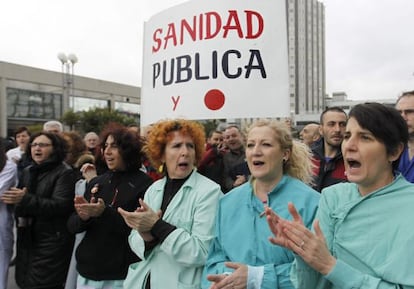Cost of failed Madrid healthcare outsourcing plan remains uncertain
Region will avoid paying 280 million euros compensation as it did not sign contracts


The announcement by Madrid regional premier Ignacio González to abandon plans to outsource the management and services at six of the region’s hospitals brought joy to many of the capital’s health centers on Monday. But it has also brought a storm of administrative, legal and economic consequences that remain to be resolved.
One of the first is if the U-turn will cost anything for the taxpayer and if so, how much. So far neither González or anyone in his team has moved to clarify whether the three companies to which the running of the hospitals had been definitively awarded will seek compensation. According to several experts, the Contracts Law gives them the right to claim damages and losses.
Contrary to what González said on Tuesday when he was asked about the position of the companies and answered that the sentence — in reality, the judicial order that confirmed the cancelation of the outsourcing plan on Monday — was “binding for everyone and because of that has to be applied,” no court has forced him to give up his healthcare plan. The decision is unilateral and political, agree the experts, but it does not strictly concern a breach of contract. And that is precisely what is going to save the regional government — which is to say, taxpayers — from having to fork out 281 million euros in compensation to the firms.
As doors close here, firms look abroad
If one firm is especially affected by the Madrid government’s decision to cancel its plans to outsource the management of six public hospitals, it is Ribera Salud, which as it watches opportunities recede in Spain has already made a mark in Peru.
Along with IDC Salud, which did not bid for the Madrid contracts, and a smattering of health insurance firms, the group controls the market for the private management of public healthcare in Spain. All of its activity — its turnover was 385 million euros in 2011 — depends on contracts for the private management of public health services, which is why losing the contracts to run the Vallecas and Sureste hospitals in Madrid is such a blow, and why the efforts it has been making in recent years to enter the foreign market have become all the more relevant. For now, it has begun its leap with a minority five-percent stake in the first two comprehensive projects to privately manage public healthcare in Latin America, at the Callao and Santa María del Triunfo hospitals in Peru.
For the other firm involved, Sanitas, part of the UK’s Bupa group, the private management of public health services only constitutes a small part of its business, which is focused on health insurance policies.
The regional government plan represented a major deal for the companies involved. The contracts to manage health services at six Madrid hospitals over 10 years were put out to tender for 4.680 billion euros. The definitive allocations were signed on August 6, 9 and 19 of last year. By then the appeals by healthcare organizations and labor unions were already with the courts, but the regional government pressed on without awaiting their outcomes. On September 3 a lower court ordered the government’s plans to be frozen for cautionary reasons. On September 11 the Madrid regional High Court confirmed that ruling. As a result the regional government was not given time to formalize the contracts with the companies and didn’t get to the point of signing them. Meanwhile, six of the appeals are still be to resolved by the Madrid regional High Court and will remain that way until González’s words become fact.
“If they had formalized the contracts, the contract holders could now demand six percent of the total price of the contract, given that it was the administration that decided to end it,” explains José Luis Muga, a lecturer in administrative law at Rey Juan Carlos University and a lawyer for Afem, the organization that led the so-called “white tide” protests against the outsourcing plan. Given the size of the contracts, that six percent equates to 281 million euros. “Now the Madrid region has to justify, in the report it presents to the companies, why it has changed the general interest and decided not to formalize the contracts,” he says. “The Contracts Law says they can seek compensation for damages and losses, but does not specify of what they consist. They have to be damages that are the direct consequence of the process. What they cannot demand, having not formalized the contract, is compensation for lost profits.”
The two Spanish healthcare firms awarded contracts, Sanitas and Ribera Salud, on Tuesday declined to confirm whether they were going to seek to claim damages and losses. EL PAÍS was unable to get in touch with the third company involved, Puerto Rico-based HIMA-San Pablo.
Experts say the firms could seek to claim back expenses they ran up preparing their bids and also have the right to ask the Madrid government to return the 28 million euros in guarantees they presented, and the expenses they clocked up in the months when the plan was frozen.
Tu suscripción se está usando en otro dispositivo
¿Quieres añadir otro usuario a tu suscripción?
Si continúas leyendo en este dispositivo, no se podrá leer en el otro.
FlechaTu suscripción se está usando en otro dispositivo y solo puedes acceder a EL PAÍS desde un dispositivo a la vez.
Si quieres compartir tu cuenta, cambia tu suscripción a la modalidad Premium, así podrás añadir otro usuario. Cada uno accederá con su propia cuenta de email, lo que os permitirá personalizar vuestra experiencia en EL PAÍS.
En el caso de no saber quién está usando tu cuenta, te recomendamos cambiar tu contraseña aquí.
Si decides continuar compartiendo tu cuenta, este mensaje se mostrará en tu dispositivo y en el de la otra persona que está usando tu cuenta de forma indefinida, afectando a tu experiencia de lectura. Puedes consultar aquí los términos y condiciones de la suscripción digital.









































